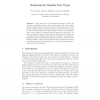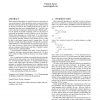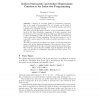678 search results - page 38 / 136 » Dependent Types for Program Understanding |
120
click to vote
JFP
2008
15 years 2 months ago
2008
We consider the problem of reconciling a dependently typed functional language with imperative features such as mutable higher-order state, pointer aliasing, and non-termination. ...
103
click to vote
TYPES
2004
Springer
15 years 7 months ago
2004
Springer
In this paper we use the Epigram language to define the universe of regular tree types—closed under empty, unit, sum, product and least fixpoint. We then present a generic deci...
122
click to vote
ICSE
2008
IEEE-ACM
16 years 3 months ago
2008
IEEE-ACM
Test-driven software development tackles the problem of operationally defining the features to be implemented by means of test cases. This approach was recently ported to the earl...
169
click to vote
HASKELL
2006
ACM
15 years 8 months ago
2006
ACM
Many numerical algorithms are specified in terms of operations on vectors and matrices. Matrix operations can be executed extremely efficiently using specialized linear algebra k...
FSTTCS
1993
Springer
15 years 6 months ago
1993
Springer
A for-loop is somewhat similar to an inductive argument. Just as the truth of a proposition P(n + 1) depends on the truth of P(n), the correctness of iteration n+1 of a for-loop de...



